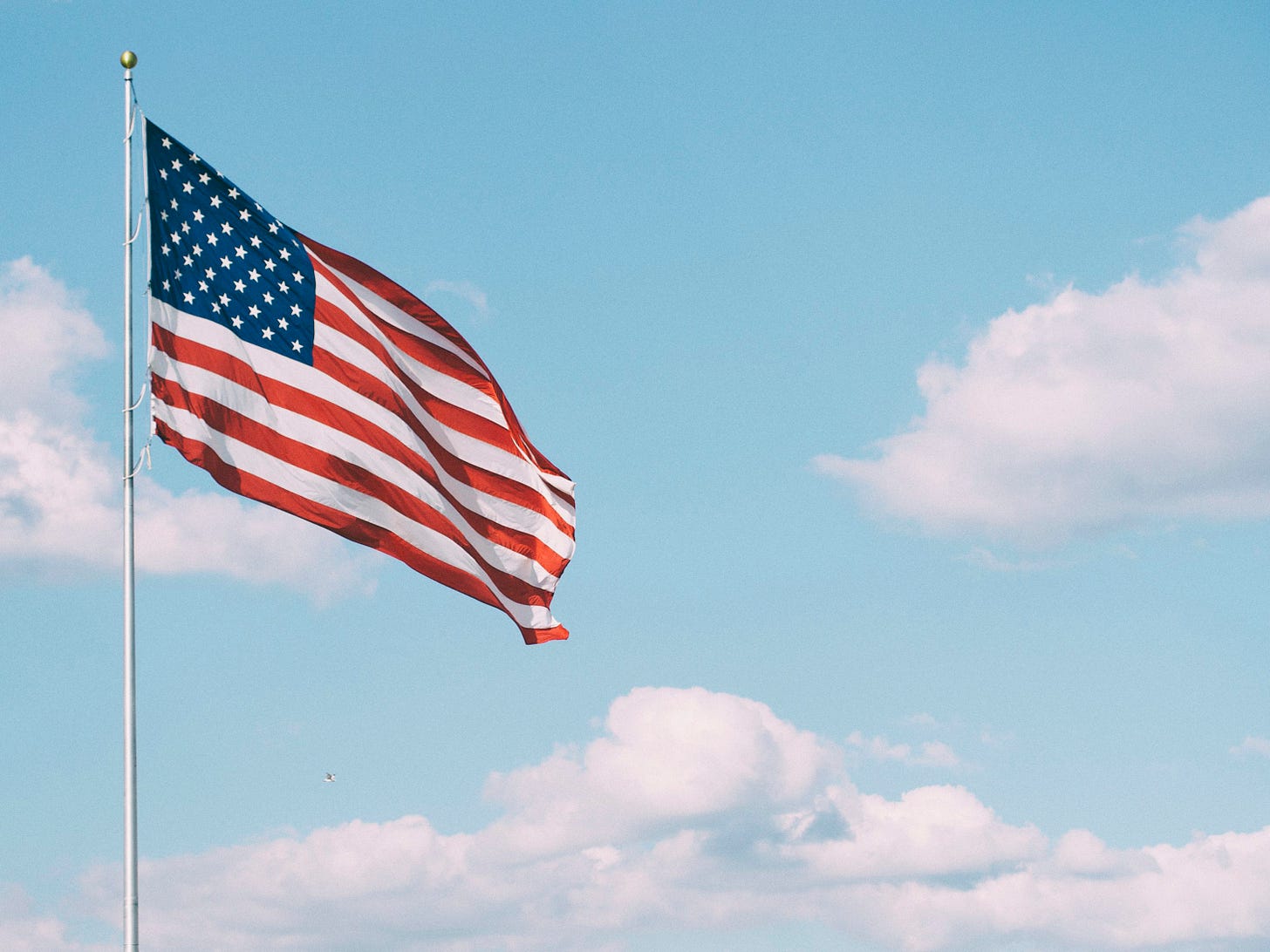Still waving the flag
After all these years, and especially today, the Fourth still means something special to me
I cannot pretend I don’t wave it with a heavier heart these days, but I will continue to wave the Stars and Stripes until I don’t have the strength to lift it. That’s my promise on this Independence Day, as I take a short break from sharing my usual observations on foreign affairs.
Long may she wave—with as much help as I can give. Courtesy Aaron Burden
I used to be a bit apathetic about celebrating Independence Day—it was always a good excuse for an outdoor barbecue and (mostly illegal) fireworks when I was growing up, and not much else. My mother’s birthday—bless her dear departed heart—was a day earlier, and that was a cause for real family celebration. (Lib would have been 103 yesterday, in case you’re interested in trivia …)
But all that began to change when I joined the Foreign Service in 1983, and for the first time, began to celebrate the Fourth of July on foreign soil. It was the occasion for a huge party, complete with fireworks and hot dogs and a small legion of foreign guests, at every post where I served—from Kingston to Riga—until I walked away from all things diplomatic in 1997. By then, it had become a habit I found I couldn’t shake.
For many years afterward, I lived in a mostly-military neighborhood near Fort Belvoir, Virginia, and it was natural to see the flag flying full-size every day on front porches—including my own. [I was also one of the vestry members who raised and lowered the flag from our parish flagpole, next door, every Sunday.] I learned that reverence from Lib, who proudly flew the flag from her front porch in my tiny hometown in North Carolina, she said, every day I was in the Foreign Service.
Now Lib was not a person given to loud displays of patriotism—she was a far more private citizen than I was, in many important ways, voting but not telling anyone for whom—but I think what she was proclaiming was “that’s my son out there serving his country—and with him, I will honor what he is doing.” After some silly vandal stole her flag and broke the wall-mounted holder, she simply stood another flag in the corner of her recessed front porch in an umbrella stand. I dare them to come on my porch …
It wasn’t just me she was honoring, of course. She was the daughter of a decorated World War I Army veteran, widow of a decorated World War II Army veteran, and mother of another Army veteran from the Vietnam era, my late brother. All were buried in our town’s Greenwood Cemetery before she passed away herself in 2019, at 96. My sister and I still make every effort to put flags at their gravesites on Memorial Day and Veterans Day.
Last year, my sister and I broke down, finally, and sold the old homestead—an early 1950s-style ranch house on a street named for General William Carey Lee, the “Father of the Airborne” in World War II—and my father’s commanding officer at Fort Bragg, where she met my father in 1943. [In the small world category, General Lee—”just plain Bill” to those who knew him best—was my grandfather’s first cousin, and attended their wedding, three months later. I never met him; he died ayear before I was born.]
Over the years, the 72-year-old house had become something of a money pit—it needed a new roof, new windows, a paint job, and a new heating system, among other pressing repairs—and a “flipper” made us an offer we hated to refuse. It has been beautifully renovated, but hasn’t been bought by a new family yet—and no flag flies there for the moment. Hope it gets one soon!
These days I live in a small condo in Broward County, Florida, where I have reduced my flag-waving to mounting smaller hand-held flags in a window crevice on my front door on special occasions, like Memorial Day. Last night, I put them back up for today’s occasion.
I remember the first July Fourth celebration I ever attended outside this country. It was a typically extravagant outdoor affair on the ambassador’s lawn—a rather large estate on Long Lane, in Stony Hill, just above Kingston, Jamaica, on the road to the North Coast. Ambassador Bill Hewitt and his wife, Tish—wonderfully gracious and remarkably understated, down-to-earth hosts, for all their immense wealth (she was the granddaughter of tractor manufacturer John Deere)—and the crowd must have numbered in the middle hundreds, at least.
It was a balmy night, with plenty of refreshments and entertainment. I had been in town for just two weeks, and as a single junior officer, not at all sure of what I was supposed to do except be polite and mingle. The Hewitts had already welcomed me to town as a guest at their dinner table the week before—a special favor which not every junior officer received, I later learned—and I was determined not to embarrass myself, at least, by having more than one beer. My “job,” after all, was to be welcoming.
The gorgeous ambassador’s residence on Long Lane, Kingston. Courtesy Jamaica Gleaner
Most of the guests, as expected, were Americans—either from the large Embassy family, which included a sizable USAID contingent and representatives of many federal agencies, not just the State Department—and their families. There were a handful of Jamaican dignitaries, as well, along with diplomats from other friendly embassies. American flags were everywhere. It was such a large crowd, of course, that it was difficult to carry on much of a conversation.
But the highlight of the evening was the fireworks—which Americans were accustomed to and enjoyed, especially the kids. The only fly in the ointment was that the U.S. Embassy had neglected to inform the Jamaican government that fireworks were even planned. It was Ambassador Hewitt’s first July 4th in Kingston—and apparently no one warned him that the island’s government should at least be notified in advance. No such fireworks display had been offered since 1972, at least.
The problem was that handguns and the like had long been banned in Jamaica during the previous administration of left-leaning Prime Minister Michael Manley—who had enjoyed using the so-called “Gun Court” to harass and imprison opposition figures between 1972 and 1980, initially detaining some of them indefinitely (until that was ruled unconstitutional). Fireworks, already strictly controlled under a 1925 colonial law, were forbidden, at least until 1980, when centrist Prime Minister Edward Seaga, a friend and ally of U.S. President Ronald Reagan, was elected.
Kingston’s South Camp Prison, home of the infamous “Gun Court.” Public domain photo
Seaga was not in attendance that night. He would almost certainly have permitted the controlled use of fireworks on the Ambassador’s estate, had he and his Ministers been asked—but whether he knew in advance of the fireworks is still not clear. As it was, no one in the crowd realized the possible implications of the fireworks overhead—and did not learn until the next day that anyone had been even surprised by it.
Jamaica’s capital made it through the evening without widespread panic, but rumors were rampant for a few hours that Manley’s supporters might be staging a coup to overthrow Seaga—or at least, throw a big scare into the JLP government. I never see a large fireworks display now without recalling the Long Lane display, and laughing to myself.
Over the years to come, I celebrated July 4th while stationed at our embassies in Copenhagen, Paramaribo, Singapore—where fireworks displays, of course, were routine for many public occasions—and Riga. Whenever at home, my wife and I sat with friends on the banks of the Potomac River and watched the Washington Monument extravaganza from nearby Alexandria, Virginia.
Now there is a fireworks show you can’t forget! Courtesy National Park Service
After leaving State, we sometimes attended the regular display at George Washington’s Mount Vernon estate—both on July 4 and on other ocasions—which was usually visible from our last home in Fairfax County, just two miles west.
And wherever I go, wherever I am, I try to remember to carry a small flag with me. It’s a habit I don’t want to shake, no matter how unsettling the circumstances become.
Many of my progressive friends are unenthusiastic about celebrating the Fourth today, given the gloomy political mood abounding across much of the country. I can certainly understand and share their reservations. In South Florida, where so many recent immigrants—including those without legal documentation—now live, it may tend to give off the wrong “vibes” to strangers, to wave the flag—symbolizing irrational government overreach, with deportations occurring on such a large scale and that travesty of a detention camp, “Alligator Alcatraz,” now open just a few miles from my home.
They call it “Alligator Alcatraz”—I call it a permanent blot on our country’s declining image. Courtesy BBC News
True, waving the flag in the trail of that ill-conceived policy could be seen by strangers as an endorsement of the current administration’s hypocritical raids at restaurants, farms, and schools—claiming that they are seeking criminals, but actually sweeping up defenseless, law-abiding grandmothers and anyone who does not resist. Nothing could be further from the truth. I do not and never will endorse such behavior by my government, no matter which tinhorn dictator proclaims it.
But I refuse to stop celebrating my country’s real history—flawed but robust—as a patriot, in my heart, at least, if only at the small family dinner my wife and I are attending later today. I could, of course, attend the larger celebration at one of our condo swimming pools—the association encourages all to come and enjoy—but I think a quieter evening indoors is perhaps best, given the thunderstorms predicted.
I will close with a nod to one of my favorite singers, Neil Diamond, whose emotional tribute to our native country, “America,” still brings a tear to my eye. He performed this rendition, honoring his Russian-born immigrant grandmother, in Los Angeles in 2012, as a friend of mine reminded me this morning—offering a good occasion for us, in her words, to “Press on with this spirit for what we once were and what we can become again!” (Thanks, Jessica.)
At least three of my great-grandparents were U.S. immigrants in the nineteeth century—seeking a new life to escape poverty and religious discrimination in Europe. Today, of course, they might as easily have been turned away. So I wave the flag in their honor.
Once again, if we are fortunate, we will become a land welcoming immigrants and refugees to this imperfect paradise our fathers and mothers helped build—no longer turning them away as unwanted rejects.
Next time: More foreign affairs in a crazy, mixed-up world








